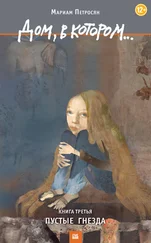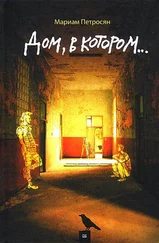Still, when it came the time to part with the last child, he started crying. Rat Fairy slapped him on the back.
“Oh, come on. You’ll have your own someday.”
She wasn't really evil, it was just that there were things she had no way of understanding.
The Waitress
Every night when her shift ended, about half past eight, she would go out into the backyard of the cafe carrying the scraps for the cats. She distributed them between two paper plates, leaned with her back against the deck railing and simply stood there, resting or maybe dreaming, until it became dark. The cats strolled around. Gray cats did it invisibly, of course, black-and-whites were half-visible. She stood there, also almost invisible except for the apron and the lace cap, hands tucked under her armpits, and waited. “The twilight is the crack between the worlds.” She'd picked up this phrase in some book, back when she still had time to read. She no longer remembered what happened in that book or who wrote it, but this phrase alone stuck in her mind. The crack between the worlds, she kept thinking, staring into the deepening blue dusk. Here. Now. When it became too dark to distinguish the shape of the lilac bush near the fence, five feet from the deck, she went back. Feeling rested and full of energy, as if the half hour she spent doing nothing cleansed her of the tiredness, the kitchen reek, and the kitchen gossip.
Because of that strange habit, the other kitchen girls started calling her Princess. Some days, when she returned to the kitchen for her bag before leaving, she heard them talking about her.
“You'd think she would run back to the child, right? But no, first she needs to nip out back for an hour, day in and day out. Some mother, is what I'm saying. If you ask me, I wouldn't let people like her within a mile of children.”
“She must be doing this because she doesn't like taking care of the baby. I have no idea who she dumps the poor thing on while she's here.”
Sometimes the woman who was relieving her shift would chime in.
“Ah, but have you looked at that baby? I'd like to see you rushing back to something like that. He's got this huge head, and a mouth full of teeth. Eight months, my eye! He gives me the willies, he does. And she wouldn't even call him by name. Tubby this and Tubby that. And he's not that fat, really.”
“Maybe his daddy was tubby.”
“Whatever he was, must've been a scary sight if the kid's taking after him.”
“Not after her, surely. She might be all speckled like a quail's egg, but she is kinda cute for that.”
She didn't pay attention to any of that talk. She couldn't afford to make a scene and lose the job. And it didn't hurt her that much anyway. Tubby was a perfect child. Not a beauty, maybe, but very clever, and he could already say at least half a dozen words. He patiently waited for her to come back from the afternoon shift, gnawing on the biscuits she'd leave him for lunch and playing with the stuffed dinosaur. The neighbors never once complained about him crying. He didn't need a nurse. He knew how to wait. They both knew, because that was the only thing they did. Together and separately, while playing, working, making dinner and eating it, in the crib, and around the back of the cafe, even in their dreams.
Their father, also the Beautiful Prince from the Not-Here, looking at the same time like the faded dinosaur with button eyes (the way Tubby imagined him) and like the small sprig of jasmine growing in a pot on her windowsill, was going to find them sooner or later, if not today then tomorrow, they only had to wait for him. And when he did, they wouldn't have to worry anymore about the price of diapers, or the vicious gossip, or any of the small inconveniences of life, because he would take them with him to his fairy land, where everything would be different. So they waited.
The Three-Fingered Man in Black
He took residence in the abandoned three-story house, the one that spawned insistent rumors of being haunted. It was some time before people noticed. The house was out of the way, and the new tenant did not turn the lights on, did not advertise his presence in any way. At first they took him for a drifter. But drifters aren't usually clean shaven, dressed in suits, or in the habit of buying a week's worth of groceries. When it became clear that the man was in the house to stay, they sent a committee made of residents of the nearby houses to clarify the situation. It was a small town, and foreigners here were usually met with suspicion.
The man amiably received the committee and politely refused to answer most of their questions. Some things they did manage to find out, though.
The owner of the house—yes, it turned out that he did exist—had hired this man to look after the property. The man showed them the papers, and the papers were all in order, even though no one could remember a time when the haunted house had been owned by anybody, and the owner's signature looked strange indeed, resembling as it did a fat spider. One of the neighbors, a retired lawyer, assured them that there appeared to have been nothing unlawful here. The man in the black suit said that he was going to remain in the house until he received further instructions from the owner. There wasn't anything they could say against that, and the committee departed, unsatisfied but with the general feeling of having done their duty.
The house had always been a strange place, so it surprised no one that its owner signed papers with a spider and sent people to guard his property when there wasn't much left of it that hadn't crumbled to dust.
The new occupant of the old house lay low for some time, and then one day this surly young woman in leather came to visit him astride a motorcycle, scaring the neighborhood cats half to death. She brought a small fair-haired girl, offloaded her, and roared away immediately. This event turned the people completely against the man. Even his single-father status could do nothing to endear him to the neighbors. Besides, the girl was an exceptionally unpleasant child.
Sphinx would take a room in the college dorm, tiny but private. He would spend the winter there, studying for the exams, and the winter would be the coldest in the last fifteen years. He would never find Mermaid. The address given by her parents would turn out to be nonexistent. Sphinx would visit everyone having the same last name as that strange family, then everyone with similar last names, and after two months of searching and asking would start to doubt if they hadn't been a hallucination.
From time to time he would receive letters from his mother. He'd read the first two. The others, unopened, would go to the bottom of his suitcase. The reams of newspapers he'd buy and scan hastily would go into a pile outside his door, growing day by day. Some of them, with articles he found interesting, would join the letters in the suitcase. The neighbors would be polite and courteous to him. At some point he'd realize that he was leading the life of a hermit and try to become more outgoing. He'd start attending student parties.
After one of them, instead of returning to his freezing room, he'd go straight to the bus stop and board the first bus of the morning, the only passenger in it. Changing buses twice, he'd arrive at the edge of town.
The House wouldn't be there, or rather it wouldn't be the House. Three walls, still standing amid mountains of bricks and rubble. Blanketed with snow. He'd walk along the fence surrounding this future building site, find a place where the boards did not come together, and sneak into the former domain of the House. One of the remaining walls would be covered in writings, from top to bottom. Names, addresses, phone numbers, short notes. He'd read all of them, and wouldn't find that which he wasn't hoping to find anyway.
Читать дальше

![Мариам Петросян - Дом, в котором… [Издание 2-е, дополненное, иллюстрированное, 2016]](/books/62844/mariam-petrosyan-dom-v-kotorom-izdanie-2-thumb.webp)









